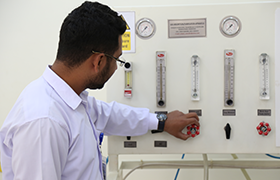| FIRST SEMESTER |
|
SECOND SEMESTER |
| Code |
Course Title |
CH |
|
Code |
Course Title |
CH |
| Ch.E-111 |
Computing Fundamentals |
2 |
|
Ch.E-102 |
Chemical Process Principles-I |
3 |
| Ch.E-111L |
Computing Fundamentals Lab |
1 |
|
Ch.E-121 |
Particle Technology |
3 |
| Ch.E-101 |
Engineering Materials |
2 |
|
Ch.E-121L |
Particle Technology Lab |
1 |
| ENG-103 |
Communication Skills |
2 |
|
PHY-101 |
Applied Physics |
3 |
| CHM-104 |
Inorganic & Analytical Chemistry |
3 |
|
CHM-105 |
Organic and Biochemistry |
3 |
| CHM-104L |
Inorganic & Analytical Chemistry Lab |
1 |
|
CHM-105L |
Organic and Biochemistry Lab |
1 |
| MTH-103 |
Calculus and Analytical Geometry |
2 |
|
ME-102L |
Mechanical Technology Lab |
1 |
| ME-101 |
Engineering Drawing |
1 |
|
PKS-101 |
Pakistan Studies |
2 |
| ME-101L |
Engineering Drawing Lab |
1 |
|
|
TOTAL (Theory + Lab) |
17 (14+3) |
| ISL-101 |
Islamic Studies |
2 |
|
|
|
|
| |
TOTAL (Theory + Lab) |
18 (15+3) |
|
|
|
|
| THIRD SEMESTER |
|
FOURTH SEMESTER |
| Code |
Course Title |
CH |
|
Code |
Course Title |
CH |
| Ch.E-201 |
Fundamentals of Fluid Mechanics |
2 |
|
Ch.E-203 |
Chemical Engineering Thermodynamics-I |
2 |
| Ch.E-201L |
Fluid Mechanics Lab |
1 |
|
Ch.E-222 |
Chemical Engineering Fluid Dynamics |
2 |
| Ch.E-231 |
Chemical Process Industries |
2 |
|
Ch.E-222L |
Chemical Engineering Fluid Dynamics Lab |
1 |
| Ch.E-202 |
Chemical Process Principles-II |
2 |
|
Ch.E-251 |
Energy Engineering |
3 |
| Ch.E-202L |
Chemical Process Principles Lab |
1 |
|
Ch.E-251L |
Energy Engineering Lab |
1 |
| Ch.E-221 |
Mechanical Separations |
2 |
|
MTH-204 |
Differential Equations & Fourier Series |
3 |
| MTH-202 |
Linear Algebra |
3 |
|
EE-208 |
Electrical Technology |
2 |
| ME-201 |
Applied Mechanics |
1 |
|
EE-208L |
Electrical Technology Lab |
1 |
| ME-201L |
Applied Mechanics Lab |
1 |
|
Ch.E-205 |
Technical Report Writing & Presentation Skills |
2 |
| |
TOTAL (Theory + Lab) |
15 (12+3) |
|
|
TOTAL (Theory + Lab) |
17 (14+3) |
| |
|
|
|
|
|
|
| FIFTH SEMESTER |
|
SIXTH SEMESTER |
| Code |
Course Title |
CH |
|
Code |
Course Title |
CH |
| Ch.E-301 |
Heat Transfer Fundamentals |
3 |
|
Ch.E-311 |
Chemical Engineering Mathematics |
2 |
| Ch.E-302 |
Mass Transfer Fundamentals |
3 |
|
Ch.E-341 |
Chemical Engineering Economics |
2 |
| Ch.E-302L |
Mass Transfer Fundamentals Lab |
1 |
|
Ch.E-342 |
Chemical Reactor Design |
2 |
| Ch.E-303 |
Chemical Reaction Engineering |
2 |
|
Ch.E-343 |
Process Heat Transfer |
3 |
| Ch.E-303L |
Chemical Reaction Engineering Lab |
1 |
|
Ch.E-343L |
Process Heat Transfer Lab |
1 |
| Ch.E-304 |
Chemical Engineering Thermodynamics-II |
2 |
|
Ch.E-344 |
Separation Processes |
3 |
| Ch.E-304L |
Chemical Engineering Thermodynamics Lab |
1 |
|
Ch.E-344L |
Separation Processes Lab |
1 |
| Ch.E-331 |
Unit Processes |
2 |
|
Ch.E-312 |
Transport Phenomena |
3 |
| MTH-306 |
Numerical Analysis |
2 |
|
|
TOTAL (Theory + Lab) |
17 (15+2) |
| MTH-306L |
Numerical Analysis Lab |
1 |
|
|
|
|
| |
TOTAL (Theory + Lab) |
18 (14+4) |
|
|
|
|
| SEVENTH SEMESTER |
|
EIGHTH SEMESTER |
| Code |
Course Title |
CH |
|
Code |
Course Title |
CH |
| Ch.E-411L |
Process Modeling & Simulation Lab-I |
1 |
|
Ch.E-444 |
Instrumentation & Process Control |
3 |
| Ch.E-441 |
Simultaneous Heat & Mass Transfer |
3 |
|
Ch.E-444L |
Instrumentation & Process Control Lab |
1 |
| Ch.E-442 |
Chemical Engineering Plant Design |
3 |
|
Ch.E-412L |
Process Modeling & Simulation Lab-II |
1 |
| Ch.E-451 |
Plant Safety and Maintenance |
2 |
|
Ch.E-452 |
Environmental Engineering |
2 |
| MGT-401 |
Engineering Management |
2 |
|
MGT-402 |
Entrepreneurship |
2 |
| HU-4xx |
Social Science Elective |
2 |
|
Ch.E-4xx |
Engineering Elective |
3 |
| Ch.E-499 |
Final Year Project-I |
3 |
|
HU-464 |
Industrial Psychology & Sociology |
2 |
| |
TOTAL (Theory + Lab) |
16 (15+1) |
|
Ch.E-499 |
Final Year Project-II |
3 |
| |
|
|
|
|
TOTAL (Theory + Lab) |
17 (15+2) |








